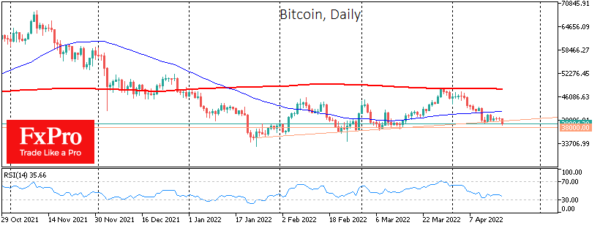Bitcoin declined by 5.7%, ending the week at around $40,300. Ethereum lost 6.6%, while other leading altcoins in the top 10 fell from 2.9% (Binance Coin) to 17% (Terra). The exception was XRP (+0.8%).
Monday began with a further 3.3% drawdown in bitcoin to $38.9K, which had fallen below its support line since January. The signal for a break of the mild upward trend would be a consolidation below the $38K levels. If the bulls capitulate, the first cryptocurrency could be pushed into the $32-35K range without much resistance. A consolidation scenario below $30K would require an absolute disaster in the financial markets. We have seen steady and impressive demand from long-term buyers as we have fallen into this area.
The total capitalisation of the crypto market, according to CoinMarketCap, fell by 7.3% over the week to $1.81 trillion. The Bitcoin Dominance Index fell by 0.5% to 40.75% over the same period.
The cryptocurrency fear and greed index lost 4 points to 24 by Monday, returning to “extreme fear” territory after two days of consolidation in “fear”.
Bitcoin declined for the second week in a row under negative stock market performance. Last week’s noticeable decline in BTC occurred on Monday amid a significant drawdown in US stock indices.
Executives of the world’s largest crypto exchanges told CNBC that they have recently noticed signs of a “crypto thaw” regarding governments’ changing attitude towards cryptocurrencies.
Portugal’s central bank has granted the country’s first crypto-asset license to a bank. Bison Bank became the first bank in Portugal to offer large customers cryptocurrency storage and trading services.
Cardano founder Hoskinson suggested that Musk join forces to create a decentralised social network if Twitter does not come under the Tesla founder’s control. Vlad Tenev, Robinhood’s CEO, said DOGE would become the most used cryptocurrency for Internet payments. However, to do so, developers must improve transaction processing speed.














